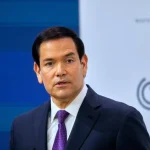
The Pentagon has announced a major change in America’s nuclear strategy: We will no longer limit the use of nuclear weapons to defense against other nuclear powers and may even consider using them for non-nuclear threats.
The new national defense strategy rejects past limits on the use of nukes, citing dual threats from China and Russia, Bloomberg reported on Thursday.
The document states that “by the 2030s the United States will, for the first time in its history face two major nuclear powers as strategic competitors and potential adversaries.” As a result, the U.S. will “maintain a very high bar for nuclear employment” but won’t rule out retaliation for non-nuclear threats to the U.S. homeland.
This new doctrine runs contrary to the policy that Joe Biden pushed when he began his 2020 campaign for the White House. Biden said that the U.S. should only use nuclear weapons to retaliate or deter a nuclear strike.
Despite Biden’s campaign promises, the new strategy was formed in cooperation with the White House, according to Bloomberg.
The Pentagon added that the geopolitical climate makes previous “no first use” and “sole purpose” policies too dangerous to remain in effect. These policies pose an “unacceptable level of risk in light of the range of non-nuclear capabilities being developed and fielded by competitors that could inflict strategic-level damage” to the U.S.
The 80-page document lays out a major change from decades of nuclear policy and defines China as a “pacing challenge,” while Russia is described as an “acute threat,” according to Time magazine.
“We chose the word ‘acute’ carefully,” Defense Secretary Lloyd Austin said during a news conference, Time reported. “Unlike China, Russia can’t systemically challenge the United States over the long-term, but Russian aggression does pose an immediate and sharp threat to our interests and values.”
Should the U.S. use nuclear weapons against non-nuclear threats?
Yes: 29% (8 Votes)
No: 71% (20 Votes)
Putin has reportedly readied his nuclear forces, putting them on combat alert in February.
“It would be the first time that a nuclear weapon has been used in over 70 years, so that certainly has a potential of changing things in the international community,” Austin added. “We’re going to continue to communicate that any type of use of a weapon of that sort, or even the talk of the use of a weapon of that sort, is dangerous and irresponsible.”
China, Austin added, is America’s “most consequential strategic competitor for the coming decades” and is “actively seeking to weaken U.S. alliances with Asian partners,” as well as “building up its military and nuclear forces” to target Taiwan and the entire Pacific Rim.
He added that China “is the only competitor out there with both the intent to reshape the international order and, increasingly, the power to do so.”
The Pentagon has determined that China is planning a threefold increase in nuclear warheads to 1,000 by 2030, Time added. The U.S. currently has a 10 to 1 advantage in nuclear weapons, but the Pentagon does not expect that to last.
“I do not want to suggest that this is a solved or closed problem and that we now have the answers,” a senior defense official told reporters, as U.S. forces continue to weaken.
“This is new territory for us. … How do you successfully fight one adversary while having enough reserve to hold the other [at] bay?”
Other factors also led to the Pentagon changing its nuclear policy. The advancement of non-nuclear weapons such as hypersonic missiles, as well as the future threat from space and cyber warfare, loom large.
This is truly a frightening time. Relaxing the criteria for using nukes is incredibly terrifying. But the U.S. now faces looming threats from world powers as well as threats based on technology that makes smaller actors more dangerous.
While scary, the change was probably inevitable.





